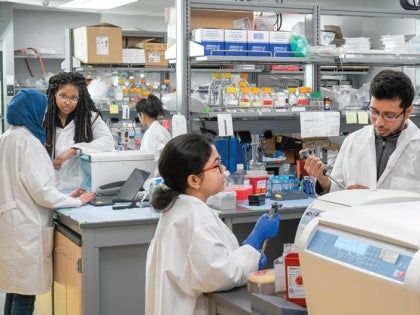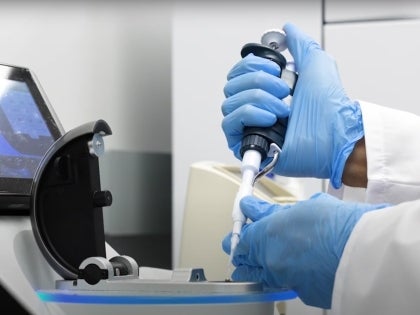Biological, Geological, and Environmental Sciences
Contact Info
Mailing Address
Cleveland State University
Bio., Geo., & Env. Sciences
2121 Euclid Avenue, BGES
Cleveland, Ohio 44115-2214
Campus Location
Science Building (SI)
2399 Euclid Avenue, Rm. 219
Contact Us
Phone: 216.687.2440
Fax: 216.687.6972
bges@csuohio.edu
Master's Degrees

Faculty members of the Department of Biological, Geological, and Environmental Sciences offer graduate training in a broad range of biological sciences. Students in the Biology MS program may conduct thesis research in one of three specializations: cell and molecular biology, ecology and evolutionary biology, and computational biology. They may also choose a non-thesis option. The graduate program is open to full-time and part-time students as well as to non-degree students who are preparing themselves for entry into degree programs or are seeking to keep abreast of new developments in their fields of interest.
The Master of Science degree in Environmental Science is offered by the Department of Biological, Geological, and Environmental Sciences. The degree program prepares students for a wide range of professional careers that require knowledge of biology, chemistry, or earth sciences in order to address environmental issues. The program is open to both full-time and part-time students. Students can complete original scientific research and a master’s thesis, and there is also a non-thesis capstone option. Students also have the option to select a concentration in Environmental Science or Computational Environmental Science. The program is administered by the department’s graduate faculty, which includes Cleveland State faculty and research scientists at several Cleveland State University adjunct faculty members from other local institutions.
Biology, MS
The Master of Science degree in Biology, MS may be earned through either a thesis or a non-thesis program. A student will be admitted to candidacy when the following requirements are met:
Thesis Option
Besides course work, the degree requires a thesis, based on original scientific research of sufficient quality for publication in a peer-reviewed scientific journal.
Non-Thesis Option
Students in the non-thesis option may earn the M.S. degree in Biology by completing a minimum of 32 credit hours of course work and passing a comprehensive examination, based on a Library Research Paper that presents a critical review of original scientific literature on a topic chosen by the student. The BGES Graduate Program Director serves as the Advisor.
Electives
Each M.S. student formulates an individual plan of study in consultation with the BGES Graduate Program Director. This includes areas of course-work concentration, as well as any additional elective courses needed to fulfill degree requirements.
Admission Requirements
Applicants must meet the College of Graduate Studies admission requirements regarding grade-point average and TOEFL results, as well as departmental standards. The BGES department expects master’s applicants to have an undergraduate grade-point average of 3.3 or higher (for the MS Bio thesis program) or 3.0 or higher (for the MS Bio nonthesis program). Official transcripts must be submitted for all prior undergraduate and graduate study. At least two letters of recommendation, preferably from faculty members, and a statement of personal career goals and research interests must be submitted by the applicant. Applicants whose native language is not English must demonstrate English language proficiency by submitting official scores for the TOEFL, iBT Test, or an equivalent examination, unless they hold a degree from a U.S. institution (see the section on International Student Admission in this Catalog).
A bachelor’s degree in biology or a related science is preferred. Students from other majors are encouraged to discuss their qualifications with the BGES Graduate Program Director and/or any potential research advisors. Applicants with a bachelor’s degree in other majors must have a minimum of one semester of statistics or calculus and one semester of college chemistry. A strong background in biology that is comparable to the Cleveland State undergraduate biology curriculum is preferred, although highly motivated students without a strong background in biology will still be considered. Questions should be directed to the BGES Graduate Program Director.
Learn more about the Biology, M.S. program and admission requirements
Environmental Science, MS
The Master of Science degree in Environmental Science, MS may be earned through either a thesis or a non-thesis program. Students may have the option to choose a concentration in Environmental Science or Computational Environmental Science.
Thesis Option
Besides course work, for students selecting the thesis option, the MS in Environmental Science degree requires a thesis based on original scientific research of sufficient quality for publication in a peer-reviewed scientific journal.
Non-Thesis Option
For students selecting the non-thesis option, a capstone project and the environmental practicum course are required.
Environmental Science Concentration
Students in the Computational Environmental Science concentration must complete the interdisciplinary core competencies including Quantitative Data Methods, Environmental Technologies, and Environmental Policy, Law, and Planning.
Computational Environmental Science Concentration
Students in the Environmental Science concentration must complete the interdisciplinary core competencies including Computational Methods, Data management and Machine Learning for Natural Sciences, and Geographic Information Systems and Remote Sensing
Electives
Each thesis student formulates an individual plan of study in consultation with the Major Advisor and the Advisory Committee. Due to differences in the number of credits of interdisciplinary core competency courses, students in the Environmental Science concentration must take at least 9 credits of electives, while students in the Computational Environmental Science concentration must take 8 credits.
Each non-thesis student formulates an individual plan of study in consultation with the EVS MS Advisor. Non-thesis students are required to take a sufficient number of electives from the following list to bring their total number of credits to a minimum of 32. Typically, this will require 12-13 credits of electives for students in the Environmental Science concentration and 8-9 credits of electives for students in the Computational Environmental Science concentration. Courses used to satisfy other requirements may not be used as electives.
Environmental Field and Laboratory Experiences
Each thesis student must complete course work that provides experience in field research and laboratory methods outside of thesis work. Because of differences in the number of credits of interdisciplinary core competency courses, students in the Environmental Science concentration must take two credits, while students in the Computational Environmental Science concentration must take one credit.
Each non-thesis student must complete four to five credit hours of course work that provides experience in field research. This requirement may be met by laboratory courses, courses that emphasize field methods (BIO 651 or BIO 653), or by supervised, independent study. Nonthesis students are encouraged to have at least 1 credit of independent study related to an internship.
Admission Information
Applicants must meet the College of Graduate Studies admission requirements regarding grade-point average and TOEFL results, as well as departmental standards. The BGES department expects applicants to have an undergraduate grade-point average of 3.0 or higher for master’s applicants. Transcripts must be submitted for all undergraduate and any previous graduate study. At least two letters of recommendation, preferably from faculty members, and a statement of personal career goals and research interests must be submitted by the applicant. Applicants whose native language is not English must demonstrate English language proficiency by submitting official scores for the TOEFL, iBT Test, or an equivalent examination, unless they hold a degree from a U.S. institution. (See the section on International Student Admission in this Catalog.)
A bachelor’s degree is preferred in environmental science or a related science (e.g. biology, chemistry, or geology). Students from other majors are encouraged to discuss their qualifications with the EVS MS Advisor and/or any potential research advisors. Applicants with a bachelor’s degree in other majors must have a minimum of two quantitative courses (calculus or statistics); two courses in biology, geology, or chemistry; and one physical science course. Strong applicants coming from other majors will have four semesters of natural science courses (such as chemistry, biology, geology, or geography). Any questions should be directed to the BGES Graduate Program Director or EVS MS Advisor.
Submit application materials to the Graduate Admissions Office (U.S. citizens and permanent residents) or the Center for International Services and Programs (international applicants and current visa holders).
Learn more about the Environmental Science M.S. program and admission requirements
Request Information
Contact Info
Mailing Address
Cleveland State University
Bio., Geo., & Env. Sciences
2121 Euclid Avenue, BGES
Cleveland, Ohio 44115-2214
Campus Location
Science Building (SI)
2399 Euclid Avenue, Rm. 219
Contact Us
Phone: 216.687.2440
Fax: 216.687.6972
bges@csuohio.edu




